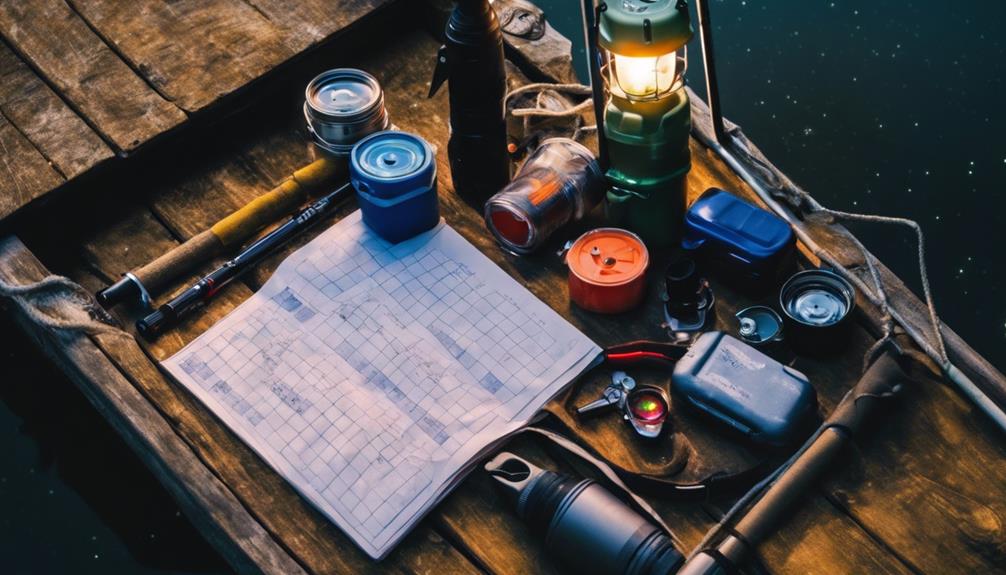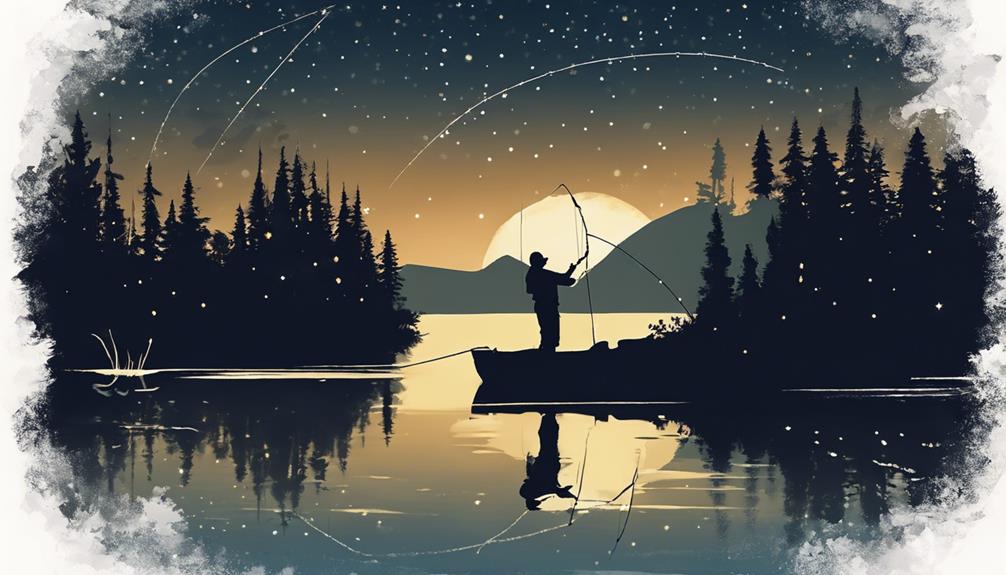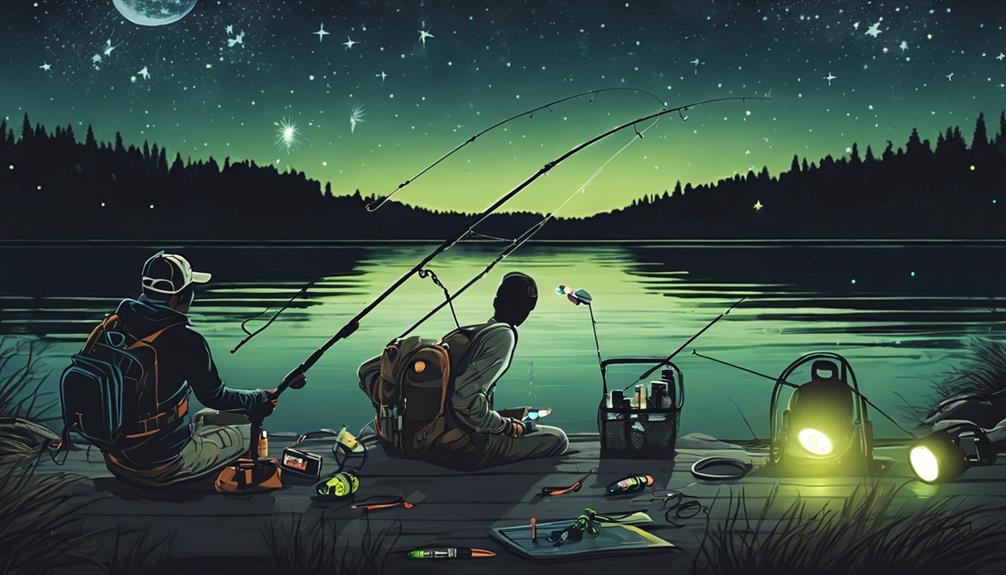Get ready for a successful night fishing trip by following these crucial steps. Begin by choosing the ideal location based on your fishing goals. Make sure the spot is safe and consider the type of fish you want to catch. Check the weather forecast to pick the right clothing and plan accordingly. Pack essential gear like tackle items, a headlamp, and first aid supplies. Set up your fishing equipment properly and understand night fishing techniques for better results. Lastly, prioritize safety by checking equipment, informing someone of your plans, and staying alert. Enhance your night fishing experience with these key steps!
Choosing the Right Location
When planning your night fishing trip, start by selecting the perfect location that suits your fishing preferences and goals. Proper lighting is crucial for a successful night fishing experience. Choose a spot with ample lighting, whether it's natural moonlight or artificial lights strategically placed around the area. This won't only help you see better but also attract fish to your location.
Consider the type of fish you want to target when selecting your location. Different fish species are attracted to specific types of environments. Research the habits and habitats of the fish you're targeting to ensure you choose a location where they're likely to be present. Additionally, make sure the location you choose is safe and easily accessible, especially in the dark.
Another essential aspect to consider when choosing the right location for your night fishing trip is having the ideal bait. Different fish are attracted to different types of bait, so it's essential to do your research beforehand. Make sure you have a variety of bait options available to increase your chances of a successful catch. Experimenting with different bait options can also help you determine what the fish in that specific location prefer.
Checking the Weather Forecast
To ensure a successful night fishing trip, be sure to check the weather forecast thoroughly before heading out on the water. The weather can significantly impact your experience, so it's crucial to be prepared. Here are some key points to consider when checking the weather forecast:
- Clothing choices: Pay attention to the expected temperature, wind speed, and any chances of rain. Dressing appropriately for the weather conditions will keep you comfortable throughout the night. Layering is a good idea as temperatures can drop during the evening hours.
- Moon phases: Knowing the moon phases can help you understand the amount of light available during your night fishing trip. A full moon provides ample light, making it easier to see, while a new moon means it will be darker. Adjust your equipment and strategy accordingly.
- Wind conditions: Check for the predicted wind speed and direction. Strong winds can make it challenging to control your boat or cast your line. Understanding the wind conditions will help you plan where to fish and how to position yourself.
- Precipitation forecast: Keep an eye on the chance of rain or storms. Fishing in the rain can be uncomfortable and potentially dangerous. It's best to reschedule your trip if severe weather is expected.
Packing Essential Gear and Supplies
Prepare your gear bag with essential items to ensure a successful and enjoyable night fishing trip. When it comes to tackle organization, consider using a tackle box or bag with compartments to keep your hooks, sinkers, lures, and other tackle items sorted and easily accessible. This will save you time and hassle when changing baits or rigs in the dark.
Light sources are crucial for night fishing. Make sure to pack a reliable headlamp for hands-free illumination while baiting hooks or handling fish. Additionally, having a good quality flashlight as a backup is wise in case your headlamp malfunctions. Consider bringing extra batteries for both light sources to avoid being left in the dark.
Don't forget to pack a fishing knife for cutting lines, removing hooks, or preparing bait. It's a versatile tool that can come in handy during your night fishing adventure. Other essential items to include in your gear bag are a first aid kit, insect repellent, and a small towel for wiping your hands or handling fish.
Setting Up Your Fishing Equipment
Gather your fishing rod, reel, and bait to set up your equipment for a successful night fishing adventure. As you prepare for the night ahead, ensuring your gear is ready can make all the difference.
Here are some essential tips to set up your fishing equipment effectively:
- Tackling Tangle Prevention: Before casting off into the darkness, make sure your lines are untangled. Check for any knots or twists that could cause issues later on. Properly spooling your line onto the reel can help prevent tangles while casting and reeling in your catch.
- Illuminate Visibility Aids: Night fishing requires proper lighting to see what you're doing and where you're casting. Attach glow sticks to the tip of your rod to track its movement in the dark. Additionally, headlamps or clip-on lights can aid in baiting hooks and handling fish without fumbling in darkness.
- Check Reel Drag Settings: Adjusting your reel's drag is crucial for successful night fishing. Ensure it's set appropriately based on the type of fish you're targeting and the strength of your line. A smooth drag system can prevent line breakage during a fight with a big catch.
- Organize Tackle Box: A well-organized tackle box can save you time and frustration while out on the water. Sort your lures, hooks, weights, and other essentials for quick access. Being able to find what you need efficiently can maximize your time spent fishing.
Understanding Night Fishing Techniques
Understanding the effective techniques for night fishing can significantly enhance your success rate and overall experience on the water. When night fishing, consider the moonlight visibility and how it affects fish behavior. Fish are often more active during nights with a bright moon, as they can see better and hunt more efficiently. On the other hand, during darker nights, fish may be less active and more cautious.
To improve your chances of a successful night fishing trip, using fishing lights can be incredibly beneficial. These lights attract insects, which in turn attract baitfish, creating a feeding frenzy that larger game fish will join. Setting up your fishing lights strategically around your location can increase your catch rate significantly.
Bait selection is crucial when night fishing. Since visibility is reduced, fish rely more on their sense of smell and lateral lines to detect prey. Utilize baits that have strong scents or create vibrations in the water to attract fish in low-light conditions. Experiment with live baits, such as nightcrawlers or minnows, or try artificial lures that produce sound or movement to entice fish in the dark.
Staying Safe and Prepared
As you gear up for your night fishing adventure, prioritizing safety and preparedness is paramount to ensure a smooth and enjoyable experience on the water. Here are some essential safety measures and tips to keep in mind before heading out:
- Check Your Gear: Before embarking on your night fishing trip, ensure that all your equipment is in good working condition. Test your lights, emergency whistle, and first aid kit to guarantee they're functioning correctly.
- Inform Emergency Contacts: Always make it a habit to inform a trusted friend or family member about your night fishing plans. Share details such as your location, expected return time, and emergency contact numbers in case something goes wrong.
- Wear Suitable Attire: Dress appropriately for the weather conditions and ensure you have extra layers to combat any temperature drops during the night. Wearing a life jacket is crucial, especially when fishing in unfamiliar waters.
- Stay Alert: Night fishing can present unique challenges, such as decreased visibility. Stay vigilant and watch out for any obstacles in the water. Carry a flashlight and regularly scan your surroundings to avoid accidents.
Frequently Asked Questions
What Are the Best Types of Bait to Use for Night Fishing?
When night fishing, the best types of bait to use are those that appeal to the fish's senses in low light conditions. Lure selection is crucial as fish behavior changes after dark.
Opt for lures that create vibrations or have bright colors to attract fish in the darkness. Consider using glow-in-the-dark lures or bait that emits scents to enhance your chances of a successful catch during your night fishing adventure.
How Can I Prevent Bugs and Insects From Bothering Me While Night Fishing?
To keep bugs at bay while night fishing, use bug repellent and apply it before heading out. Wear long sleeves and pants to minimize exposed skin. Regularly check your fishing gear for any signs of insects and clean it thoroughly after each trip. Store your gear properly to prevent bugs from nesting in it.
These techniques will help ensure a more enjoyable night fishing experience without the annoyance of pesky insects.
Is It Necessary to Bring a Portable Light Source for Night Fishing?
You should definitely bring a portable light source for night fishing. Safety precautions are crucial when navigating dark waters. A light source not only helps you see where you're going but also ensures you can spot any potential hazards in the water.
Additionally, when it comes to night fishing techniques, having a light source can attract fish to your location, increasing your chances of a successful catch. So, don't forget to pack that light!
What Is the Best Way to Keep My Catch Fresh During a Night Fishing Trip?
To keep your catch fresh during a night fishing trip, make sure you pack plenty of ice packs and a good cooler. Proper fish storage and preservation is key to maintaining the quality of your haul.
Place the fish on top of the ice packs in the cooler to keep them cold and fresh throughout the night. This method will help you enjoy a delicious meal with your freshly caught fish.
Are There Any Specific Regulations or Permits Required for Night Fishing in Certain Areas?
When planning your night fishing excursion, it's crucial to check for any specific regulations or permits in the area you'll be fishing. Different regions may have varying rules regarding night fishing, so it's best to be informed.
Make sure you have the necessary permits and follow the regulations to ensure a smooth and legal fishing experience. Additionally, familiarize yourself with some night fishing safety tips to make the most of your trip while staying safe on the water.
Conclusion
Now that you have all the necessary steps to organize your night fishing trip, you can confidently head out and enjoy a successful and memorable experience.
Remember to choose the right location, check the weather forecast, pack essential gear, set up your equipment, understand night fishing techniques, and prioritize safety.
With these tips in mind, you'll be well-prepared for a fantastic night on the water catching some big fish.
Happy fishing!



